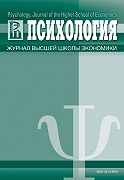The Contribution of Gender, Age, and Reinforcement Sensitivity to the Structure of Personality Traits and Problem Behaviors in Children and Adolescents
Abstract
The questionnaire study examined the contribution of gender, age and reinforcement sensitivity to the common structure of child personality and problem behaviors in two samples, parent reports of 2-18-year-olds (N = 968) and self-reports of 11-18-year-olds (N = 1543), using the Inventory of Child Individual Differences – Short version (ICID-S) to measure personality, the Strengths and Difficulties Questionnaire (SDQ) to assess emotional and behavioral problems, and the Sensitivity to Punishment and Sensitivity to Reward Questionnaire (SPSRQ). A joint factor analysis of the ICID-S and SDQ scales suggested a four-factor structure, including Organization, Positive, Behavior Problems, and Internalizing. This four-factor model was remarkably similar to previously reported models of personality and psychopathology. Congruence coefficients indicated that factors based on parent reports and adolescent self-reports were highly similar at all levels of the hierarchy. Gender, age, sensitivity to punishment, and sensitivity to reward generally made independent contributions to personality-psychopathology factors. Sensitivity to reward made a substantial contribution to Externalizing (conduct problems, hyperactivity and inattention), whereas sensitivity to punishment contributed to Internalizing (shyness, fears and emotional symptoms). The link between sensitivity to punishment and Internalizing in older adolescents was stronger than in younger. The protective effect of punishment sensitivity on Externalizing was found in girls only. These findings demonstrate the role of motivational brain-behavior systems in the development of normal and abnormal patterns of behavior and emotions.





